#good omens meta
Text
Gabriel w/The Final 15 clue back in 2.01





Just one of the main ways, eh? 😉
Gabriel doesn't have his memory in 2.01 but he knows on a fundamental level that looks can be deceiving and a being's identity is more than their face. He learned that when the love of his life got a new face and he accepted it easily because a person is more than their appearance. What someone looks like is just one of the ways to determine who they are and people might not be who you think.
Aziraphale let Gabriel into the bookshop because, fundamentally, he recognized in the Gabriel-looking being who showed up at the door the possibility that Jim was a side of Gabriel that Aziraphale didn't know as well but had glimpsed before a little in the past enough to believe existed. In this way, Aziraphale really did recognize Gabriel.
But Aziraphale and the angels did not recognize the last visitor to the bookshop in 2.06 and the being who identified him-- Crowley-- is subject to The Devil's deception. There is still no proof at all that Aziraphale actually got into the elevator with The Metatron because we can't prove that being actually was The Metatron. Everyone assuming that he is because of his face might be overlooking the clue in Gabriel's dialogue back at the start of the season.
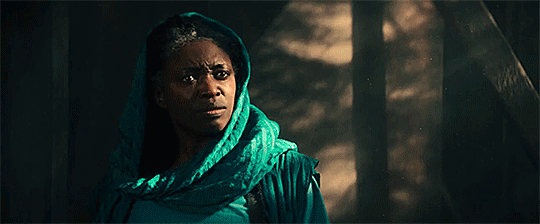
#good omens#good omens meta#good omens 2#good omens theory#crowley#aziraphale#ineffable husbands#aziracrow#the archangel fucking gabriel
37 notes
·
View notes
Text
Good Omens season 3 thought of the day.
When exactly did Crowley start wearing glasses and why? Was it really for it to be easier to be around humans? Or did something occur between him and Aziraphale? Something where maybe his feelings were showing just a little too clearly. And perhaps he needed to hide that away for his own sake? And will we get any reference or flashback to it in season 3? If the reasons have anything to do with a perceived rejection from Aziraphale (from Crowley’s point of view), then something like that might be very important to be included in the final season.
#good omens#good omens season 3#good omens thought of the day#Crowley#Aziraphale#good omens theories#good omens headcanons#Headcanons#good omens discussions#good omens meta#good omens fandom#ineffable husbands
27 notes
·
View notes
Text
Supplement one to Part 1. About "rings" and "a spring in a box"
This post is in Russian/Этот пост есть на русском, здесь.
Preface "Marvelous!" | Part 1
There's a lot more great stuff sewn into the scene where Aziraphale drops the items in the magic shop!
"Hats"

When Aziraphale enters the shop, he politely removes his hat, but similar hats are hung behind him in the shot because it's a prominent detail of his trip to Edinburgh.
"The Angel in the Bentley and the Four Rings"
In that Part 1 I convinced you: the authors know how to make perfect parallels. But what is more important, these parallels also coincide in terms of emotions.
Look, both in the scene of things falling and in the trip to Edinburgh, Aziraphale feels stupid and awkward deep down, and we sympathize with him, but also regret that he disappointed us so much.
But when playing with the four rings, Aziraphale looks at Crowley with adoration, as if hinting at their conversation about Bentley Yellowness. By the way, these rings are gold. How beautiful! The angel is in a very good mood in both scenes.
"The Demon-Snake and the Curtain"
Now this is an absolute gem! A compact example of a perfect parallel! We look at the background around Crowley at the moment when Azi plays with the rings. In the frame next to the demon, we can see a snake statue, which is framed by... A theater curtain! Bentley's number is actually NIATRUC. It's a curtain (a theater curtain), only from right to left. Moreover, the snake in the frame is located between the curtains, but still in the distance, that is, now we have Crowley not inside the Bentley. And what is this glass ball between the snake and the curtain? A coincidence, probably. And then it dawned on me! The ball is placed in front of the curtain so that both the snake and the audience are looking at the curtain as if through it. And the glass ball is a lens that turns objects over, changing top with bottom, and right with left! NIATRUC!
We will see this ball in "Part 2", but as a symbol of the Earth. Things here often carry a double load of meaning.
The curtain is not black and not yellow, like the Bentley. But it is red, this is Crowley's color in the hint system. And the fringe is gold, like the rings. And the snake statue is red.
What about emotions? Crowley himself looks pleased in this shot. I do not argue, he grumbled at Azi on the radio, but in general he likes talking to the angel. In the scene of the first season, he also reluctantly blows the stain off his shoulder, and he himself is glad that he was persuaded.
I also thought that since Crowley calls Aziraphale in the car, they should have added some ringing object here. And there is one! The rings in Azi's hands are ringing! No, think about it, Aziraphale in this allegory hears Crowley's call not just anyhow, but through the Bentley.
"Trick Box with a Spring"

Crowley is very scared of the spring with tinsel that flew out of the box! And Az is scared along with him. And the seller laughs, repeating: "Very funny! You'll die laughing!"
If you want, think that the spring that jumped out is Gabriel-Jim, whom Crowley was so scared of when he unexpectedly saw him in the bookstore. Or that the spring is a yellow duster. Then the seller acts as the audience of the series, who unanimously think that it was very funny when Crowley was scared of Jim. And for the collection of analogies: the spring and tinsel that flew out of the box up and beyond the edge of the frame were compared in the fandom with Azicrow's joint miracle that went beyond the bookstore. All three versions come down to Gabriel.
Yeah, Gabriel's arrival at the bookstore has put quite a bit of stress on our heroes. So, Gabriel is a symbol of false, vain fear, he's a joke, a dud. Here they hint at it, laugh, they say. And in the season finale, Gabriel's harmlessness was confirmed. So trust the emotions in the clues, they more truthfully communicate the true emotions of the characters and the meanings in symmetrical scenes.
"The bell button and just enough of a bastard"

After the scare, Crowley is shown laughing sincerely and good-naturedly for quite a while. We rarely see him so happy. Is he really that happy for Gabriel and Beelzebub? There are no hints of this couple in the frame. No flies, no yellow feathers. But there is a hint of another scene.
Now we will talk about the apology dance, forgive me. Many people don’t like it because of the feeling of coercion and because the author reminds us that an angel is not always a sweetheart. But the formula of the apology dance has already come in handy once, as evidence, so don’t you dare brush it off. I can’t stand zombies, but it looks like I’ll have to dig around in the footage with them too. The detective’s work is not always pleasant, but it bears honest fruit. Many clues in the season are irritating, but they are capable of attracting the attention of the viewer-detective.
Before the scare, this trick box is persistently shoved into our eyes, pushed to the foreground. What does the box look like? Yes, it depicted the bookstore at the moment of the miracle. But now it is also a button-bell for visitors to the bookstore, which Crowley pressed in the scene of the apology dance. Just look at how the shots with "The Button and Crowley Before the Dance" and "The Box and the Trick Seller" are arranged: a figure on the left, a button on the right, a diagonal strip of the carpet and a diagonal strip of the counter, a vertical strip of the column and a vertical strip of the golden curtain. I am attaching the picture.
The bump on top of the box is made in the shape of Aziraphale's pocket watch, and the brown color of the box is Aziraphale's color. These signs also hint to me that the box is connected with an angel who, deep down, is enough of a bastard to be worth knowing. Accept that this bastard made the Serpent dance, because the demon likes the bastardry in the angel.
The way Crowley smiles long and well, and doesn't let go of the box for all this long time, personally clearly tells me that the apology dance stroked not only my kinks and fetishes. If this were not so, the authors, who carefully build every little detail in every frame, would have prompted Crowley to throw the box on the counter after the spring flew out, and as quickly as possible.

But if you don't like my idea, then you can consider that Crowley enjoyed doing their miracle together with Aziraphale. As with Gabriel, the authors here provided us with a range of interpretations. The last frame of the trip, where Bentley turns black again, contains tartan mountains and a snake-shaped monster splashing nearby. That is, the conversation about Bentley's color was not a quarrel, Aziraphale and Crowley finished it, emotionally feeling close to each other.
"Arrogance and ears"
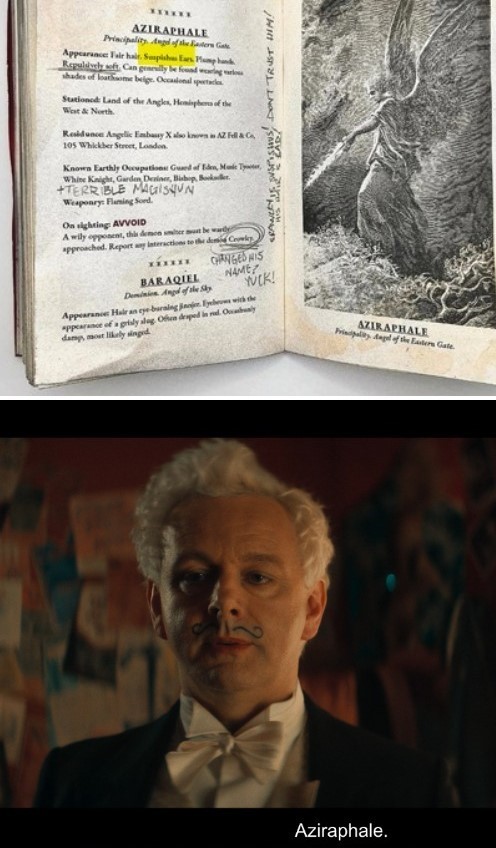
I'll add about the dance, although it's not about tricks. Although, it's hard to say!
Aziraphale's phrase "I hear" right before the Serpent's dance and the subsequent arrogant "Very well" rhymes in my head with how the angel arrogantly corrected Furfur when he misinterpreted his name while reading the angel reference book. And the reference book contains the absurd phrase "has suspicious ears." Yeah. He hears with them. And the trick on Furfur is nearby. I have other arguments that Aziraphale's ears are important, but for now I'll have to put this pulp aside. The size of posts and your attention (precious for me) is not endless.
***
About the trick seller's table at the moment when everything was falling and ringing. There, next to the snake statuette hugging the bell with its tail, are two goblin figures. And in Edinburgh, next to the angel ringing the Snake, are two goblin figures. (There is a false movie blooper connected with these goblin figures, I will describe it in the post about the cups. There is also a brilliant parallel in emotions there.)
And there is one statue. True, there is a snake statue on the table, and in Edinburgh there is a statue of Gabriel, but the word "statue" is played with.
Homework for the inquisitive: why is the "three ropes" trick called "The Professor's Nightmare"? I don't know.
Ah, I know! Emotions help. Professor Hoffman praised Aziraphale for his tricks. And Crowley praised Aziraphale for the trick with the caraway seed, and how he praised him! And the trick with three similar ropes refers to Crowley's nightmare from the first season, when our demon mixed up the babies.
I am especially pleased that the inscription that Professor Hoffman made in the book could have been written to the angel by Crowley himself: "To the wonderful student." After all, the angel in the two previous flashbacks (with Job and with the gravediggers) showed himself to be his excellent student!

***
The thing is, "Queen" was playing at Nina's cafe, and there was a board with the inscription "Honolulu Roast". This is a reference to the story of the Queen of Honolulu. (From the post https://www.tumblr.com/indigovigilance/730554435104915456/honolulu-roast) Nefertiti is also a queen. And the words Nefer-ti-ti and Hono-lu-lu are similar. And just a beautiful thing: when Nefertiti is mentioned, I think of Honolulu by the consonance. It was lucky that two queens are connected by such similar words in structure! But is there any meaning in this connection, or just beauty, I'm not sure.
The next part will be here.
All my posts with analyses are here.
Author @rada-76
Translator into English @kimberleyjean
#good omens#good omens 2#ineffable husbands#aziracrow#aziraphale#crowley#good omens parallels#good omens analysis#good ineffable omens#good omens meta#gos2#ineffable spouses#good omens clues#good omens theory#good omens thoughts#good omens theories
21 notes
·
View notes
Text
“their miracle was so big bc crowley used to be an archangel” have u considered that aziraphale and crowley love each other so much that their love alone could move the tides just by staring at the ocean for too long. have u considered that they did the miracle not really to protect gabriel but to protect what they had, what they’d built with each other. and that was them barely even trying
#sorry but the whole ‘crowley was an archangel’ take is not the one for this scenario#the whole thesis of the show is that they’re more powerful and at their best when they’re together#their combined miracle is just a manifestation of that#and i can’t wait to see how they use that bit in s3#good omens#good omens meta#go2 spoilers#thoughts
36K notes
·
View notes
Text
Awhile ago @ouidamforeman made this post:
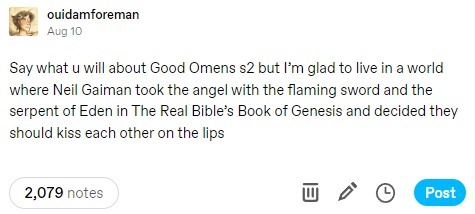
This shot through my brain like a chain of firecrackers, so, without derailing the original post, I have some THOUGHTS to add about why this concept is not only hilarious (because it is), but also...
It. It kind of fucks. Severely.
And in a delightfully Pratchett-y way, I'd dare to suggest.
I'll explain:
As inferred above, both Crowley AND Aziraphale have canonical Biblical counterparts. Not by name, no, but by function.
Crowley, of course, is the serpent of Eden.
(note on the serpent of Eden: In Genesis 3:1-15, at least, the serpent is not identified as anything other than a serpent, albeit one that can talk. Later, it will be variously interpreted as a traitorous agent of Hell, as a demon, as a guise of Satan himself, etc. In Good Omens --as a slinky ginger who walks funny)
Lesser known, at least so far as I can tell, is the flaming sword. It, too, appears in Genesis 3, in the very last line:
"So he drove out the man; and placed at the east of the garden of Eden Cherubims, and a flaming sword which turned every way, to keep the way of the tree of life."
--Genesis 3:24, KJV
Thanks to translation ambiguity, there is some debate concerning the nature of the flaming sword --is it a divine weapon given unto one of the Cherubim (if so, why only one)? Or is it an independent entity, which takes the form of a sword (as other angelic beings take the form of wheels and such)? For our purposes, I don't think the distinction matters. The guard at the gate of Eden, whether an angel wielding the sword or an angel who IS the sword, is Aziraphale.
(note on the flaming sword: in some traditions --Eastern Orthodox, for example-- it is held that upon Christ's death and resurrection, the flaming sword gave up it's post and vanished from Eden for good. By these sensibilities, the removal of the sword signifies the redemption and salvation of man.
...Put a pin in that. We're coming back to it.)
So, we have our pair. The Serpent and the Sword, introduced at the beginning and the end (ha) of the very same chapter of Genesis.
But here's the important bit, the bit that's not immediately obvious, the bit that nonetheless encapsulates one of the central themes, if not THE central theme, of Good Omens:
The Sword was never intended to guard Eden while Adam and Eve were still in it.
Do you understand?
The Sword's function was never to protect them. It doesn't even appear until after they've already fallen. No... it was to usher Adam and Eve from the garden, and then keep them out. It was a threat. It was a punishment.
The flaming sword was given to be used against them.
So. Again. We have our pair. The Serpent and the Sword: the inception and the consequence of original sin, personified. They are the one-two punch that launches mankind from paradise, after Hell lures it to destruction and Heaven condemns it for being destroyed. Which is to say that despite being, supposedly, hereditary enemies on two different sides of a celestial cold war, they are actually unified by one purpose, one pivotal role to play in the Divine Plan: completely fucking humanity over.
That's how it's supposed to go. It is written.
...But, in Good Omens, they're not just the Serpent and the Sword.
They're Crowley and Aziraphale.
(author begins to go insane from emotion under the cut)
In Good Omens, humanity is handed it's salvation (pin!) scarcely half an hour after losing it. Instead of looming over God's empty garden, the sword protects a very sad, very scared and very pregnant girl. And no, not because a blameless martyr suffered and died for the privilege, either.
It was just that she'd had such a bad day. And there were vicious animals out there. And Aziraphale worried she would be cold.
...I need to impress upon you how much this is NOT just a matter of being careless with company property. With this one act of kindness, Aziraphale is undermining the whole entire POINT of the expulsion from Eden. God Herself confronts him about it, and he lies. To God.
And the Serpent--
(Crowley, that is, who wonders what's so bad about knowing the difference between good and evil anyway; who thinks that maybe he did a GOOD thing when he tempted Eve with the apple; who objects that God is over-reacting to a first offense; who knows what it is to fall but not what it is to be comforted after the fact...)
--just goes ahead and falls in love with him about it.
As for Crowley --I barely need to explain him, right? People have been making the 'didn't the serpent actually do us a solid?' argument for centuries. But if I'm going to quote one of them, it may as well be the one Neil Gaiman wrote ficlet about:
"If the account given in Genesis is really true, ought we not, after all, to thank this serpent? He was the first schoolmaster, the first advocate of learning, the first enemy of ignorance, the first to whisper in human ears the sacred word liberty, the creator of ambition, the author of modesty, of inquiry, of doubt, of investigation, of progress and of civilization."
--Robert G. Ingersoll
The first to ask questions.
Even beyond flattering literary interpretation, we know that Crowley is, so often, discreetly running damage control on the machinations of Heaven and Hell. When he can get away with it. Occasionally, when he can't (1827).
And Aziraphale loves him for it, too. Loves him back.
And so this romance plays out over millennia, where they fall in love with each other but also the world, because of each other and because of the world. But it begins in Eden. Where, instead of acting as the first Earthly example of Divine/Diabolical collusion and callousness--
(other examples --the flood; the bet with Satan; the back channels; the exchange of Holy Water and Hellfire; and on and on...)
--they refuse. Without even necessarily knowing they're doing it, they just refuse. Refuse to trivialize human life, and refuse to hate each other.
To write a story about the Serpent and the Sword falling in love is to write a story about transgression.
Not just in the sense that they are a demon and an angel, and it's ~forbidden. That's part of it, yeah, but the greater part of it is that they are THIS demon and angel, in particular. From The Real Bible's Book of Genesis, in the chapter where man falls.
It's the sort of thing you write and laugh. And then you look at it. And you think. And then you frown, and you sit up a little straighter. And you think.
And then you keep writing.
And what emerges hits you like a goddamn truck.
(...A lot of Pratchett reads that way. I believe Gaiman when he says Pratchett would have been happy with the romance, by the way. I really really do).
It's a story about transgression, about love as transgression. They break the rules by loving each other, by loving creation, and by rejecting the hatred and hypocrisy that would have triangulated them as a unified blow against humanity, before humanity had even really got started. And yeah, hell, it's a queer romance too, just to really drive the point home (oh, that!!! THAT!!!)
...I could spend a long time wildly gesturing at this and never be satisfied. Instead of watching me do that (I'll spare you), please look at this gif:
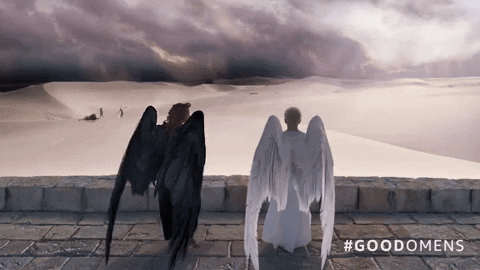
I love this shot so much.
Look at Eve and Crowley moving, at the same time in the same direction, towards their respective wielders of the flaming sword. Adam reaches out and takes her hand; Aziraphale reaches out and covers him with a wing.
You know what a shot like that establishes? Likeness. Commonality. Kinship.
"Our side" was never just Crowley and Aziraphale. Crowley says as much at the end of season 1 ("--all of us against all of them."). From the beginning, "our side" was Crowley, Aziraphale, and every single human being. Lately that's around 8 billion, but once upon a time it was just two other people. Another couple. The primeval mother and father.
But Adam and Eve die, eventually. Humanity grows without them. It's Crowley and Aziraphale who remain, and who protect it. Who...oversee it's upbringing.
Godfathers. Sort of.
#good omens#ineffable husbands#aziracrow#good omens 2#crowley#aziraphale#good omens meta#I have no idea if I've made a coherent point here but I'm tired of this being in my drafts; RAW FEELINGS IT IS#it's about being sent to destroy and instead staying to love and protect and nurture I'M CRAZY I'M CRAZY RAAAAAAAGGHHHH#gnu terry pratchett
27K notes
·
View notes
Text
crowley must have known that aziraphale was also in love with him, he tidied the bookshop, he was planning on taking him to the Ritz after his confession, he had their song queued in the car these are not acts of someone who wasn't sure what the outcome will be.
which makes it so much more painful that he still confessed his love for aziraphale with tears in his eyes and on the verge of a full blown panic attack, he left saying "don't bother" but he still waited by his car til the elevator doors closed. all because

#alex says things#I’m going to jump off a cliff btw#good omens#ineffable husbands#good omens season 2#aziraphale#crowley#aziracrow#good omens meta
22K notes
·
View notes
Text
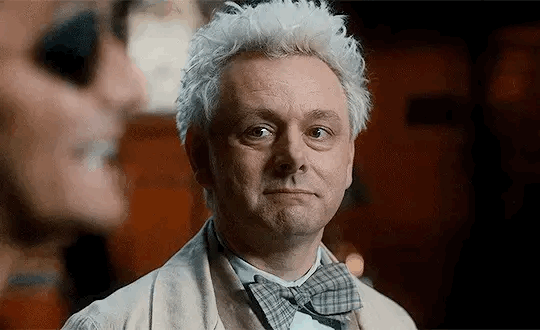
So, I feel like I’m losing my mind. I keep seeing metas about how Aziraphale wants Crowley to return to Heaven and be an angel again because he wants them to be on the same side/be good/change/etc., etc., etc. but I don’t see that at all. I actually see it as the very opposite.
Aziraphale loves Crowley just as he is. But there’s something more. Something huge.
Aziraphale loves Crowley and because he is an angel who is stuck in seeing things as black and white, he constantly praises Crowley for being nice. For being good. For being kind.
Aziraphale has watched Crowley on and off for 6,000 years. He watched him thwart the plans of Heaven and Hell because it was unjust. He spared the lives of innocents. He did small things that made Aziraphale happy just because (like making Hamlet successful and saving valuable books). And because Aziraphale sees things in black and white, he sees all the things Crowley has done as nice, as good, as kind.
Crowley vehemently attests he’s not nice or good or kind.
He’s not exactly wrong nor is he lying when he says this. When Crowley spares goats during a cruel bet over a righteous man and swallowing laudanum to prevent a suicide, when he prevents Armageddon by working with Aziraphale and stopping the Anti-Christ from being the Anti-Christ, he’s not doing the nice/good/kind thing.
He’s doing the right thing.
Crowley chooses to do the right thing without hesitation. He is better than all of Heaven and Hell who have callous and dispassionate view of all existence because he questions, because he makes choices. Crowley sees the world for all its messiness and he sees himself. He sees a place where he fits in. He sees the blurred edges.
And Aziraphale sees that, even if seeing the blurred edges is hard for him.
But here’s the thing that Aziraphale can’t voice.
It’s the reason why he told Crowley about being allowed to return to Heaven and become an angel again. He doesn’t want Crowley to change. He doesn’t think Crowley is flawed. Or not enough.
It’s something that is so monumental that it cannot be put into words. Because to put it into words would be more than blasphemy. It’s down right unthinkable for anyone in Heaven, Hell, or Earth to say what Aziraphale knows deep in his soul.
God was wrong to cast out Crowley.
Aziraphale believes Crowley can/should return to Heaven because he knows that Crowley should never have fallen in the first place. He wants him to be forgiven because when Crowley fell it was unjust. Aziraphale is trying to correct a mistake. He’s trying to do the right thing.
Yes, Crowley would never accept returning to Heaven. And Aziraphale was wrong to even suggest it (although that conversation is another can of worms to unpack).
Aziraphale loves Crowley. He loves him exactly as he is. He doesn’t want him to change. Aziraphale knows that Crowley the best of all of them. He wants to change Heaven because of it. Because God was wrong and Aziraphale knows it.
Aziraphale may have difficulty seeing beyond black and white, but when it comes to Crowley he sees everything crystal clear and in vivid color.

#good omens#good omens 2#good omens meta#hold on to your butts#because here be outright blasphemy#aziraphale#crowley#neil gaiman#warning this post has been known to cause psychic damage#and in one instance a proposal of marriage#neil liked this post#whaaaaaaaaaaat#good omens spoilers#michael sheen#david tennant#ineffable husbands#tell me I’m wrong
27K notes
·
View notes
Text
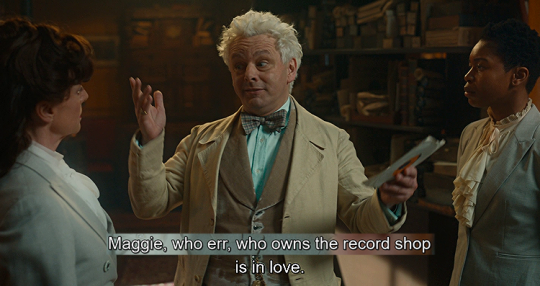
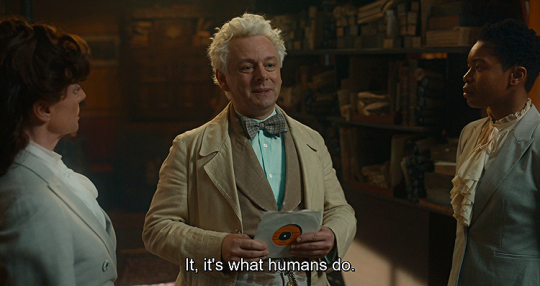
Can we go back to this for a sec? To Aziraphale having to explain the concept of being in love to the other angels? Because I cannot imagine what a trip it has to be, falling in love with someone when that is literally not something you are supposed to be able to do. When it is something you barely understand. When the object of whatever this is isn't supposed to be able to feel this way either, except as time goes on you start to realize it's happening to him too. And neither of you can actually talk to each other about it.
#here they are infected by humanity in the best way but at the same time it's also a trap because what can they do with it#The concept of falling in love for angels is useless at best and blasphemous at worst!#You're supposed to be devoted to God alone#and forget demons#they're from the same stock and anyway you're supposed to be out for yourself#v watches good omens#good omens meta#aziraphale
17K notes
·
View notes
Text
Asdfghjkl

‘DON’T [TRY] THE GUY WITH THE BLACK GLASSES HE DOESN’T WORK HERE!’
Local Soho lurker, known associate of Mr. Fell, inspiring so much lust around him people flock to the brothel to see if they can spend some quality time with him. And it happens so frequently Mrs. Sandwich had to put a sign up.
Alternatively, as @cassieoh (thank you for brightening the image!!) suggested: ‘DON’T [PAY] THE GUY WITH THE BLACK GLASSES HE DOESN’T WORK HERE!’
Poor Mrs. Sandwich. ‘Yes I know he looks like he works as a seamstress, but he does NOT, so if you could kindly pay me, thank you very much.’
I can’t decide which is funnier, Crowley accepting money from Mrs. Sandwich’s patrons (does he cackle as he does this? Is he confused? Does he walk the money over to her afterwards or do something else with it?) or Mrs. Sandwich having to march over to him and sternly asking him to stop letting patrons pay him instead (does she cock her hip and stick out her hand? Does she laugh along with him? Do they bond over it?? Are Crowley and Mrs. Sandwich buds???)
‘You’re a good lad.’
#gos2 spoilers#good omens 2#good omens season 2#good omens 2 spoilers#good omens#crowley#Mrs. Sandwich#set design#good omens meta
21K notes
·
View notes
Text
Lesley and Maud
@drconstellation wrote a really interesting meta about our favorite International Express Package Dude that got my brain humming about him and his wife. What can they tell us about Crowley & Aziraphale and the story as a whole?

As the good doctor's above meta points out, Lesley is not the type to question, well... basically anything. While he is a likable character and we root for him to survive and keep living what seems like his nice and peaceful life with his sweet wife, he is also one of the most exasperating characters in Good Omens because what starts out seeming like just his devotion to his job turns out to be a lack of questioning on such a level as to directly be the cause of his death and the enabling of Armageddon.
We initially might admire Lesley's devotion to extracting a sense of self from his job. While we think he's maybe working a bit too hard and while we know what packages he's going to be delivering and so want him to just go back to bed and be safe with his wife, it's hard to hate a man who sees his duty as service to others. The world really does need people who will, for the most part, just deliver packages without asking what's in them or questioning the process because they are upholding the privacy, dignity and freedom of others in doing so. They are helping others to live their lives so these people deserve respect for what they do. On the one hand, Lesley not asking details regarding the packages seems like a way of not seeing it as his business which, well... fair. It's not his business.
It's just that Lesley takes this way, way too far... past a point of reasonable behavior because, at some point, questions need to be asked, if only for preserving safety for yourself or others.
As his story continues, we increasingly are silently begging Lesley to question something, anything about these packages he's been assigned to deliver on this Saturday morning, instead of just doing it. We need him to stop because he's further triggering Armageddon with each delivery he makes, right? We also just care about him and it becomes evident that this man has zero self-preservation skills. He delivers a package to a group of people armed to the teeth. Most chilling, he doesn't seem to think twice about the fact that he doesn't have to deliver a message to Death if he doesn't actually want to.
What's so unnerving about Lesley, though, is that while we can appreciate the idea that he doesn't get involved with whatever is happening when he's delivering these packages, his lack of interest in them is symbolizing the fact that he is just a profoundly incurious person. His story seems to be asking the question of at what point that becomes a moral failing.
On the one hand, a definition of freedom could include someone's right to not care about how others live. The problem with this is that everything and everyone is interconnected. We have a responsibility to one another and to the planet we are all sharing. At what point does inaction become a form of negative action? Lesley is different from other incurious characters in the series. He's not the Nazi Zombie Flesheaters, for instance, whose lack of imagination, curiosity, critical thinking skills and empathy lead them to believe them superior to others and to take action to oppress others. Greta, Glozier and Harmony are villainous because of those things but Lesley is subtly just as interesting a story along a similar theme.
No one, at first pass, would call Lesley a villain and he's definitely sympathetic at times but, mostly, he's pitiable. We feel kind of sorry for him. We definitely feel sorry for his wife, who at least questioned Lesley's lack of questioning and tried to look after him a bit. As Lesley's story continues, though, he becomes increasingly tragic. He just continues to do what he's been ordered to do, a cog in the machine, and even continues that after he dies doing it and comes back to life. Lesley isn't even terribly curious about all of that. He's just like whoa, what a day! to Crowley and Aziraphale-- two powerful, supernatural beings who are so mind-fucked by the events of the last day that they're drinking on a park bench and beginning the first of what we know will be a thousand conversations about What It All Means.
Lesley seems to be something of a nod towards the sheep mindset of religious fundamentalists and cult followers, etc. He doesn't think for himself. The question with his story is at what point does that go from being he's a sad and tragic character we feel a bit sorry for to he's that but he's actually also an antagonistic character because his actions-- or inactions, really-- are doing harm?
As Lesley approached Pollution with their package, God's narration gave us backstory on Lesley and Maud's relationship to the polluted river which Pollution was admiring. God tells us that the river never used to be polluted like this and that, back when it wasn't, Lesley and Maud would come to this park and walk and picnic and spoon and fork along the river. God's narration specifically says Lesley and Maud stopped coming to the river when it was polluted and, since the river is still polluted, is pointing out the fact that these two that had an emotional attachment to the river as part of the history of their love for one another have done nothing to change the state of their environment and are letting it worsen.
Lesley then doesn't counter Pollution's assessment of the environmental devastation as "beautiful," even when it's evident that Lesley disagrees with that statement. This is one of Lesley's only personal opinions that we are allowed to glimpse but, in seeing it, we actually can think a bit worse of him. How much of his time and effort would it take to do join others in doing something about the river? Not just even any river, but the one alongside which he courted the wife he loves?
He doesn't question enough, though, to see that he can. He's not curious enough about anything. He only blindly follows what he's been told to think and believe and do.
In this way, while Lesley is a deliverer, he's actually a parallel to-- but the exact opposite of-- our professional deliverer (professional midwife), Crowley.

Crowley's signature trait is his asking of questions. He does not blindly follow the directions of others the way that Lesley does. In the Job minisode that declares Crowley a deliverer, we know that his outfit is inspired by that of one of the Bible's most famous deliverers, Moses, in Cecil B. Demille's The Ten Commandments, as in the scene when Moses turns his staff into a serpent. Crowley's parallel of Jesus is the other big "deliverer from sin" in the Bible. In the "professional midwife" scene, Crowley literally delivers Sitis from evil by stopping her from cursing God.

Crowley's role in the series is around delivering people anew from their pain. He's a cobbler-- he repairs and re-pairs people. He plays Cupid with Maggie and Nina to help both of them live more fulfilling lives. He pairs Mr. Brown up with Mutt, knowing that Mr. Brown needs some kindness and human magic in his life. At other times, he's literally delivering something or someone-- the antichrist baby in the picnic basket. Black market alcohol to The Windmill.

In addition to this, he's a deliverer in the rescuer sense. He comes to people's emotional rescue and, with Aziraphale, that and sometimes his literal rescue.

So, while Crowley is a more expansive definition of a deliverer, Lesley is paralleling him in a much more basic sort of way-- he delivers packages-- and contrasting Crowley as he parallels him, in that Lesley doesn't ask questions.
Let's bring in some word stuff and look at Lesley's name and that of his wife's for a moment...
Lesley's name is, structurally, the same as Crowley's and is also a gender-neutral name, which pairs well with Crowley. Additionally, the first part of his name-- les-- is both French for a plural sense of the & them... The Them... and also derogatory/occasionally reclaimed throughout history slang for a lesbian. So, yes, Crowley-esque already but the actual definition of Lesley is even more so.
Lesley is thought to come from the Gaelic leas celyn, which means holly garden. A garden for the Serpent of Eden who is a gardener, yes, but the holly is even more important. Holly is a red berry-- a Crowley-colored fruit-- that is synonymous with Christmas, the holiday around the birth of Crowley's other contrasting parallel, Jesus. Additionally, holly shares etymological roots with Hell... so, there's both Heaven and Hell in this.
Then, there's Lesley's wife, Maud. Maud is a name in its own right as well as being a nickname of the name from which it is derived, which is Mathilde. Mathilde means mighty in battle.
Let's talk about why that's perfect for a character who predominantly parallels Aziraphale, as there is perhaps not a word that describes Aziraphale better than the mighty might.
On the one hand, when we talk about might, we talk about strength. We use it in terms of describing raw power-- "the might of NATO's collective armed forces", say, or "she pulled open the door using all her might."
On the other hand, as the other tense of the word may, it's a polite word about possibility and permission. This word that means strong and force not to be reckoned with is also a word of consent.
You'd be hard-pressed to find a word more Aziraphale than that.
It would appear that Crowley agrees because several scenes suggest that they are using might as descriptive for Aziraphale in their wordplay. One would imagine Crowley would find it hard to resist not just because of the perfectly Aziraphaleness of the word but also for the sake of blasphemy because what do people call God?
The Almighty. 😉
Additionally, might has a homophone of mite, another insect for the bees/flies/ants/murder hornets figurative language fiesta. The dust mite does seem good for antiquarian bookseller Aziraphale. The word mite is also in the action of the righteous angel that also means to strike down with love and infatuation-- to smite.

Gabriel smiting the dust mites 🤭

But let's factor in the 'battle' part of this meaning as well. There are two ways to read "mighty in battle" and they are both correct when applied to Aziraphale.
One is that Aziraphale is "mighty in battle" in the sense that he has to do a lot of battling. A battle is not just a clash in a war where war is large-scale military conflict but an internal battle. It's battling your own inner demons. Aziraphale is "mighty in battle" in the sense that he has has to fight through a lot but he is also "mighty in battle" in the other way to take the phrase-- he is mighty (strong) in battle. He's full of inner strength that helps him to get through those battles. This is also perfectly Aziraphale because mental health struggles are not weakness and Aziraphale is a character who exemplifies that very well. He has times when he doesn't feel very strong but he is overall a strong person, as are so many who struggle. He's mighty in battle.
Additionally, there's that if you break down Maud a bit, you get mau, which is a form of cat. Her name is a kind of cat and she calls Lesley "tiger."
As @jotun-philosopher has been looking at, Crowley and Aziraphale have a thing about lions. Crowley's desk chair in S1 and Aziraphale's signet ring are lions. It's probably tied to the two of them watching Adam kill the lion from the wall in Eden. While Maud and Lesley are using tigers, Crowley and Aziraphale are using the parallel lions, and both are types of big cats.
From a language perspective, cats are fun animal parallels because they're gender-neutral. While cats have a history of feminine-associations-- see: common, cat-related euphemisms for a vagina, for starters-- jazz-era slang used cat for masculine-presenting beings just as much. A cat in that context was a man who was cool-- a real hep cat.
When Shadwell asks Crowley in 1967 if he is "a witch or warlock or someone who calls his cat funny names", Crowley responded by saying: "Not a witch. No pets." One of the end results there is that Crowley said he didn't have any pets (which is kind of a lie, as he has The Plants lol) but he never says that he doesn't have a cat, does he? He doesn't have a cat in the pet sense but he has one in the person sense and they absolutely call each other "funny names"-- in the punny, pet name sense, not in a witchy sense.

So, anyway, lots of paralleling big cats. Lions and tigers (and bears somewhere, I'm sure, oh my!).
Ok, so, Lesley and Maud are very Crowley and Aziraphale and what can the brief glimpse of their relationship maybe tell us about Crowley and Aziraphale's?

There's a lot here in the scene with Maud. Have a look at the colors in it to start. Their bedroom is white (Aziraphale) and shades of a silvery, light grey (Crowley). Aziraphale's sweater that he wears in the bookshop is basically the same color as Maud and Lesley's sheets.

It's the burst of brighter color here, though, that really stands out and that is Maud's night clothes.
That is an orangey-pink color-- it's a coral pink or a salmon pink. It's a pink of the sea. Over here, I went on about the use of shades of pink-- the color of love, romance and health-- in the series, as well as fish-and-the-sea as Crowley and Aziraphale's figurative language for sex. Maud and Lesley's bedroom is a mix of Crowley and Aziraphale colors, offset by a color symbolic of a healthy romantic life. In this way, they don't differ from Crowley and Aziraphale, but their circumstances in this same scene show where they do.
The scene that introduces these two to parallel Crowley and Aziraphale is centered around Lesley and Maud in their version of the one room in the bookshop we still haven't yet been in but which has been alluded to in other ways-- their bedroom. The scene is centered around Maud waking up in bed while Lesley is leaving to go make his deliveries. Just by knowing Crowley and Aziraphale, we can see where they would differ from Lesley and Maud in a parallel situation to this scene.
The first difference is that this is an unusual occurrence for Maud and Lesley. Maud is used to having her partner in bed with her on Saturday mornings. She is surprised that he is up and going to work. She will miss him and wishes he doesn't have to go but she also isn't too concerned about him because, in their world, she does not have to be.
During this scene, the audience is actually a bit more worried about Lesley than Maud (or Lesley) are because we already have enough context to be able to assume that we're meeting Lesley because he's the guy who is going to go deliver the stuff to summon The Four Horsepeople of the Apocalypse. We're all hey, nice guy, maybe you should stay in bed with your wife. Just call in sick, man. What's coming up for you will absolutely not be worth it! It makes sense, though, that Lesley and Maud don't feel that same level of threat because, while there is some risk to delivering packages, most days Lesley is just dropping off people's new stuff from the internet. This man delivers blenders and socks and books and stuff. Maud is sure he'll be fine and home by dinner.
Now, compare that to Crowley and Aziraphale...
Crowley and Aziraphale would love to live like Lesley and Maud. To get married and share a little place somewhere together and not park The Bentley streets away and to still be snuggling in bed when the sun comes up in the morning without worrying that they're going to get caught and be killed. In their world, it's not a rare thing for Crowley to be slipping out of bed before sunrise as that's the norm.
There is a lot to suggest that "the rules" of their relationship to which Aziraphale is referring in Lockdown are basically that it's too dangerous for Crowley to stay the night and that he leaves the bookshop before the sun comes up to keep them from being caught. In other posts, some of us have also talked about the idea that slipping out the side door of the bookshop is how Crowley became friendly with Mrs. Sandwich and looked at things like Crowley parking The Bentley away from the shop in different scenes, especially when he's staying into the night in 2008 in 1.01.
The "no nightingale" scene from Romeo & Juliet being Romeo sneaking out of Juliet's bed before dawn. The "no nightlife" dream:

"Dining at the Ritz" also has a secondary meaning related to this. While dining today means eating any type of snack or meal at any time of the day, it didn't originally mean that. It once only referred to eating breakfast. The Ritz is homophonic for "the writs." Writs are written works. "Dining at The Ritz" means dining at The Ritz but it also means something that Crowley and Aziraphale still have not yet done that we've seen-- having breakfast in the bookshop.

Meanwhile, Aziraphale would kill to live with Maud's sense of surety that her husband will return after he leaves. S2, in particular, gets into Aziraphale's trauma from once having Crowley disappeared to Hell in front of him. Living as a demon is a lot more dangerous for Crowley than delivering packages is for Lesley and Aziraphale worries every time Crowley leaves that he might not come back, to a point that Crowley is shown reassuring Aziraphale that he'll return, something it's doubtful he's saying in the scene below for the first time.


But something of note here, too, is that while this scene that introduces Lesley and Maud starts off with pretty clear Crowley = Lesley and Aziraphale = Maud paralleling, Crowley and Aziraphale mirror one another and basically all pairs of characters in the series are mixed parallels of both of them. This is true of even some parallels where one character seems to skew pretty heavily towards one character over the other, like Anathema and Newt, as well as ones that are shown to be pretty well-mixed parallels, like Maggie and Nina in S2 or Gabriel and Beez. So, where do Lesley and Maud start to flip parallels a bit?
It's in when Lesley delivers his last package-- the message to Death-- and then the Lesley = Aziraphale holds through the end of S1, setting up Aziraphale mirroring some Lesley in S2.
Lesley sees what he is to deliver to Death and, again, doesn't ask questions (FFS LESLEY lol) but when he feels he's trapped by the package he must deliver, what does he do? He writes a note for his wife and leaves it on the dash of his truck. The note is simple and to the point. It just reads: I love you, Maud.
Its mirror scene? Aziraphale having The Bentley play Crowley "A Nightingale Sang in Berkeley Square."

Suddenly, we have a whole different tone to Lesley's story happening-- just as the end of S2 expanded to show us a whole different tone to Aziraphale's. Suddenly, the suicide ideation that smashes up at the end of a certain short story about S2's beloved bananafish feels at play here in these stories as well.
Maybe Lesley was never quite as okay as he seemed and that's why he was willing to leave his wife a note and deliver a package to Death. Maybe he didn't exactly mean to die but he also never saw himself as an individual enough to question a directive that would lead to his death. Maybe, contrasting Lesley, there's Aziraphale in S2, going around the neighborhood with his Lesley-like clipboard and giving away his possessions, delivering his own end times, it not yet clear that he's pushing himself too fast too quickly and is headed for a breakdown.
Lesley and Aziraphale are both the only characters to see Death appear in front of them in the series so far and a fall is a kind of death. Lesley is one of the only characters in the series to actually die and he's basically S1's version of The Second Coming already, as he comes back to life when Adam resets reality. Lesley's story is tied to The Final 15 more than we might realize though we likely have to wait until S3 to see it all play out.

Lesley is still on the clock after coming back to life lol. He has learned exactly nothing from this. Him living is somehow as much of a tragedy as if he had died because what happened to him does not appear to have really affected him much and he is still just carrying on, doing the job that is his entire identity. He's picking up a box from two random dudes on a bench in front of a church all wow, what a day, huh! Like, dude... go the fuck home to your wife. You died. Take the evening off. Why the hell are you still at work?!
In this way, he's the complete opposite of both Crowley and Aziraphale, really, as both of them ask enough questions that, even at their worst, they'll never be masking a lack of a sense of self through a false sense of purpose as much as Lesley is.
Whatever else of his story Crowley and Aziraphale wind up mirroring won't be exactly the same but the paralleling stories also meeting a bit for the first time at the end of S1, when Lesley picks up the box, is quite sweet, in that it's not even really the box so much that ties the stories together but the mention of the absent Maud.
Lesley tells the main characters whose story he's crossed into that, if he were to tell his wife what happened to him that day, she wouldn't believe him, right? It's what he says before walking away with the box, leaving us with thoughts of Maud. As Lesley's story finishes in the season, so too does the parallel, and we get to the heart of it through the mention of Lesley's wife, as that is then what causes Aziraphale to look at Crowley with thoughtful fondness. It is taking the spousal parallel the audience sees and showing the characters themselves seeing it, too, as Aziraphale thinks about how he doesn't have to worry that his wife won't believe him today because she's been through it all with him.

Lesley and Maud began in the story seeming to be living the kind of life that Crowley and Aziraphale would love to have for themselves-- and there are elements of that life that Crowley and Aziraphale really would love to have. They're dying for their cottage and some cozy mornings of domestic fluff. What the story winds up showing us, though, is that Crowley and Aziraphale, individually and together, are much more free-thinking than Lesley and that they know one another so much better than Lesley and Maud do. While Lesley and Maud may have a marriage licence and the ability to be in bed together at dawn, they aren't sharing their lives and living a curious, free-thinking one together in the way that Crowley and Aziraphale already do.
#good omens#ineffable husbands#crowley#aziraphale#aziracrow#good omens meta#good omens 2#good omens theory#crowley x aziraphale#ineffable husbands speak#etymology#lesley and maud
44 notes
·
View notes
Text
Good Omens season 3 thought of the day:
Did anyone watch that special of Sherlock where it was set in the original 1800’s timeframe, and then by the end it’s revealed it’s just modern day Sherlock having a kind of drug induced hallucination?
What if we get that in season 3 of Good Omens? A bunch of different vignettes of AU Crowley and Aziraphale because one or both of them is fantasising or hallucinating alternate stories of themselves. Maybe one of them asks the question, “Do you think we’re together in other universes?” Montage of human, reverse, and alternate canon scenes flash across the screen.
Either that or Benedict Cumberbatch and Martin Freeman suddenly turn up as alternate Crowley and Aziraphale. Hell, throw in Peter Serafinowicz and Mark Heap and then they can all stand and point at each other like the Spider-Man meme.
#good omens#good omens thought of the day#good omens season 3#good omens season 3 thought of the day#good omens fandom#good omens discussions#crowley#aziraphale#ineffable husbands#aziracrow#crowley x arizaphale#good omens meta#good omens headcanons#headcanon
21 notes
·
View notes
Text
Crowley is a romantic. And they stole his love confession from him.
The confession we saw was rushed. I think Crowley could tell something was different. It was now or never. And that’s why he started to confess then. But
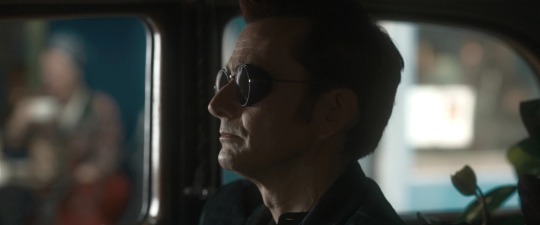
his original plan was to take Aziraphale to the Ritz. They would get into the Bently, yellow tulips on the backseat, like we can see. Because yellow is pretty, like the angel said before. And A Nightingale Sang In Berkeley Square would play, he had put it on queue, we heard it. And they would get to the Ritz, have a wonderful breakfast. He would give him the flowers, take him back home, give him a lift, like in the movies, and then he would confess. And they could kiss at the door before they went inside.
But instead his confession was rushed and desperate and not at all like what they show in the movies. It was painfully real and unmagical.
12K notes
·
View notes
Text
Thinking about that video of David and Michael describing Crowley and Aziraphale's date night. Aziraphale doing all the things he loves and Crowley complaining the whole night and the two of them "having just the best time". And also thinking about how folks feel uncomfortable with how Aziraphale pushed to take the Bentley even when Crowley complained and then made changes to her and Crowley insisted on changing it back.
Crowley complains not because anything is really wrong but because he feels comfortable enough to do so. (When something's really wrong, he takes action.)
You know what "asking too many damn fool questions" is really? Complaining that things aren't being done properly.
Aziraphale creates a safe space for Crowley to whinge and whine and grumble and growl and roll his eyes and sigh heavily and demand his own way and have someone hear his complaints and not throw him out. And Crowley understands that when Aziraphale does something over the top, he is allowed to complain. And in the end they will find a compromise place where Crowley is comfortable with what's happening but he can still whine and Aziraphale can do the things he loves with Crowley's support (even when it sounds grudging). That's their whole, 6000+ year relationship.
Aziraphale did change the Bentley, but not back. Not all the way. She's a new Bentley from then on. She's their car now, and we don't hear a peep from Crowley about it.
5K notes
·
View notes
Text
DO NOT ASK NEIL ABOUT FAN THEORY
Michael babygirl, I apologize now for the close-up screenshots of your mouth I am going to put on the internet. Call Neil if you have issues with it, it's his fault. Brain-rotting brought on by the lovely @melbatron5000!!!

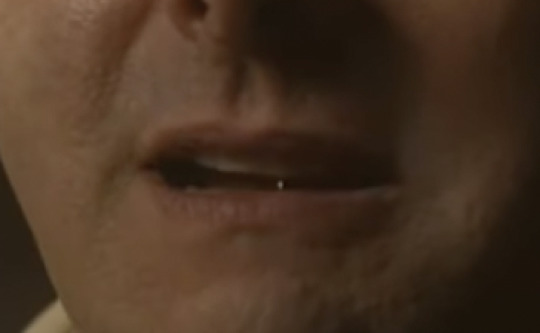
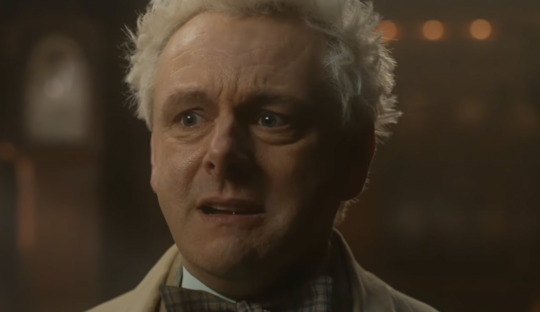
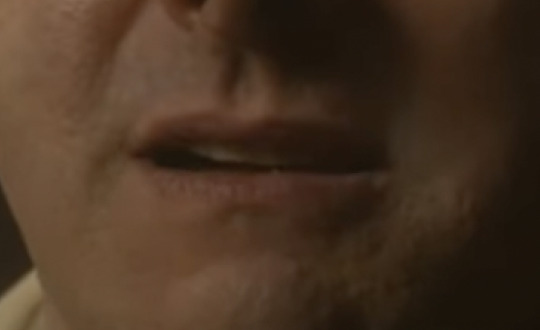
Honey, why are you chewing on a ball bearing? I was going to be lenient and say it's a glint off of some saliva but nah are you sucking on a damn pie weight. I didn't see you take a bite of any dippin dots??? Who let her near my stash of Buckyballs that I've been hiding from the Consumer Product Safety Commission? Just because you are bbgurl doesn't mean you get to eat bbpellets.
#good omens#good omens 2#michael sheen#aziraphale#good omens meta#crowley#david tennant#crowley x aziraphale#good omens theories#good omens clues#good omens theory#good omens fandom#ineffable idiots#ineffable husbands#aziracrow#anthony j crowley#good omens crowley#good omens kiss#i zoomed in and gurl its just so round#like perfectly round#they really did the bullet catch 2.0 didnt they
4K notes
·
View notes
Text
I wanna talk about The Angel Who Would Be Crowley.
Because I had a certain set of expectations, which got thoroughly trashed in the first five minutes of S2, and my genuine response is, "Oh, fuck, yup. You're right. That's WAY better."
Looking around at GO fandom, I'm not alone in this. So let's talk about it.
Basically, a lot of people (myself included) believed that he was a high-ranking angel, and therefore as chilly and remote as every other powerful angel we'd seen at that point. We pictured Crowley-To-Be as long-haired, regal and imposing --and the fanart at the time reflected this. I'd link some if Tumblr didn't hate links.
Something like this:
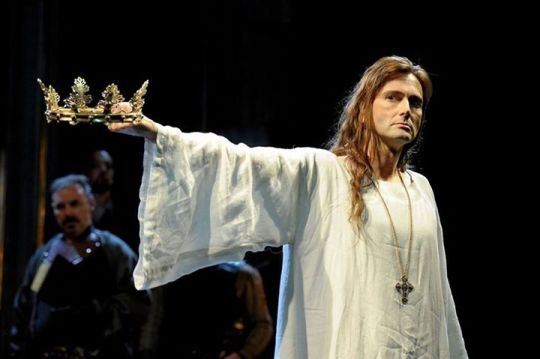
We were collectively drawing on a few things --mostly, Crawly's appearance and general bearing in the Biblical scenes of S1--
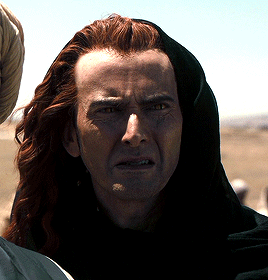
--But also scattered hints of his importance, backed up by conspicuous absences in Heaven and a few profound displays of power. That's all better covered elsewhere, so I won't reiterate the arguments here. All I'm saying is: I think our headcanons were justified.
But it turns out he was this:
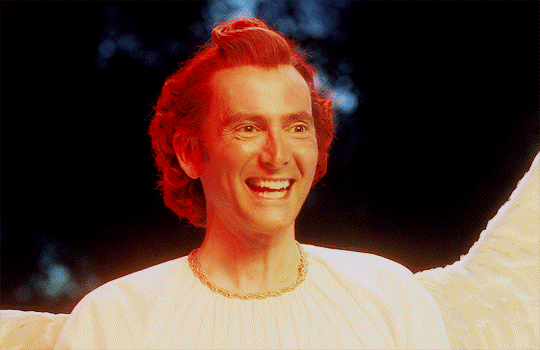
!!!
With his curly little--!!
And his neat white--!!
IT TURNS OUT, he was an angel who squeaked and squealed when he was happy; who flailed his arms around and made explosion noises with his mouth to explain nebulas; who preened when told his stars were pretty. Furfur, who knew him before the Fall, says:
"You used to jump on me back, little monkey in a waistcoat..."
(The use of a diminutive there, 'little'...oh, that fascinates me.)
In a pretty huge subversion of expectations, we're given these glimpses of an angel who was sweet, and joyful, and heart-meltingly silly.
In sum...an innocent.
(Perhaps innocent to a troubling degree.
We see how he troubles Aziraphale, during their first conversation. He starts looking around and behind them, checking to make sure that no one can HEAR the blithe and reckless things coming out of this angel's mouth. This angel who talks like he's never been reprimanded in his life; like it's never occurred to him that anyone would want to hurt him.
Before the Beginning, Aziraphale understood Heaven better than he did. The danger is plainly occurring to Aziraphale.)
So now, we the viewers are in on a cruel joke that Aziraphale has known all along, which is that this --THIS-- is the angel who--
*checks notes*
--did a million lightyear freestyle dive into a boiling pool of sulphur. For asking questions.
...Imagine you are Aziraphale, and everything inside you wants to believe Heaven are the Good Guys, and God is Good and Everything She does is capital-R Right...and now try to reconcile that. Keep trying. I don't think he ever totally managed it in 6000 years.
All this gets further complicated when we learn that, despite all of the above, we were still right. That sweet excitable babby up there?
He WAS a powerful and high-ranking angel.
That much is explicitly confirmed, with significant evidence that he could have been among the mightiest of archangels...
...Who apparently accosted his fellow angels for piggyback rides. And was remembered millennia later by those (now fallen) angels as something 'little.'
What does that tell us about who he was? Is?
Hell, Aziraphale has known to be wary of the archangels (and the judgements of Heaven in general) since before the Fall even happened. He chooses to believe they are Good; he can't fool himself into thinking they are Safe.
Yet he's absolutely certain that Crowley won't hurt Job's children. Enough to stand in a burning building and say to them, "I can't save you, but don't be afraid. I won't need to."
And what reason does he give?
("I know you."
"You do not know me."
"I know the angel you were.")
What does that tell us about who he was? Is?
("The angel you knew is not me."
But how is Aziraphale supposed to believe that, when he can see him all the time?)
tl;dr --yes, this is better. I love the tragedy of it.
'Innocence died screaming' and all that.
13K notes
·
View notes
Text
Oh, god. I understand now. This look Aziraphale has right after Crowley kissed him. I didn't understand why he'd look disgusted when we as the audience know that their feelings are mutual, and as Neil hinted, they both wanted to confess in this episode, but the Metatron changed that. "Do it again."
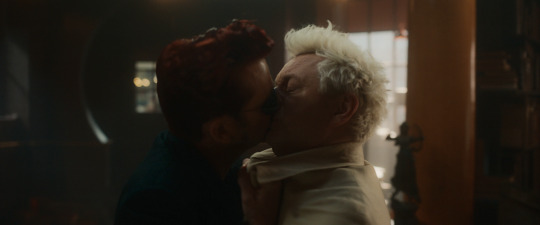

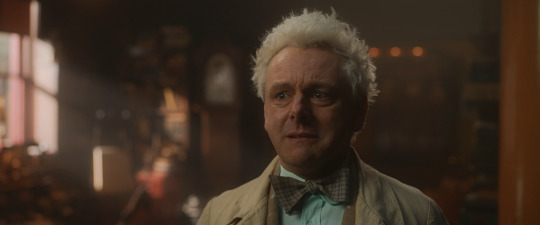


Richard Siken//Good Omens
#alex says things#I LOVE making things worse <3#good omens#good omens meta#ineffable husbands#aziracrow#anthony j crowley#aziraphale
9K notes
·
View notes